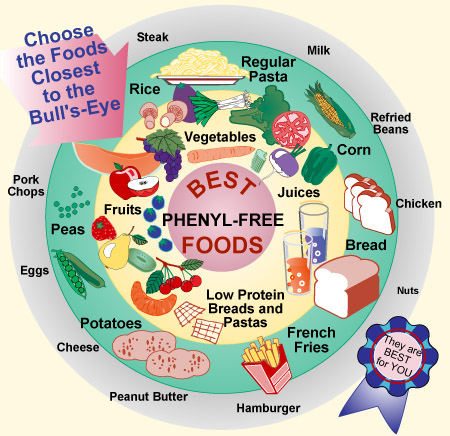The Essentials of PKU
For Young Adults with PKU and their Significant Others
- What is PKU? |
- What is the diet for PKU? |
- How long must a person with PKU follow this special diet?
- What is maternal PKU? |
- How is PKU monitored? |
- Food records |
- Friends have a special role
What is PKU?
PKU stands for Phenylketonuria (PHE-NYL-KE-TON-URIA). Phenylketonuria is an inherited disorder. About one in every 15,000 infants born in the United States has PKU. People who are born with PKU are normal in every way except to stay healthy they must follow a strict diet which limits phenylalanine, a common part of most food. People with PKU have an inactive liver enzyme. (See figure 1)
Phenylalanine is only one of the many amino acids which are joined together to form proteins. Normally, when a person eats foods containing protein, their body uses the amino acids from that protein for growth and repair of body tissues. Often we eat amino acids in excess of the body's needs. These excess amino acids are chemically changed by enzymes into other compounds or used for energy. Since individuals with PKU are missing the enzyme for normal phenylalanine break down, the excess eaten in foods accumulates in the blood and begins to damage the brain.
If blood phenylalanine levels stay too high for a long time, the damage to the developing brain is severe and irreversible. The harmful effects of PKU can be prevented if a diet low in phenylalanine is started in early infancy and maintained throughout life. The phenylalanine restricted diet is the only way to bring blood phenylalanine levels down to a safe level. At these safe levels, that is less than 10 mg/dL, the brain can function normally and the person with PKU can learn easily and have stable emotions.

Figure 1
Normally, phenylalanine is converted to tyrosine by an enzyme called phenylalanine hydroxylase. However, in individuals with PKU, this enzyme is not present and results in a damaging build-up of phenylalanine in the body.
What is the Diet for PKU?
The diet for PKU consists of a milk substitute or formula such as Phenyl-Free 2* and measured amounts of fruits, vegetables, bread, pasta and cereals.
Many foods must be eliminated from a low phenylalanine diet. These foods are high protein foods such as milk and dairy products, meat, fish, chicken, eggs, beans and nuts which contain large amounts of phenylalanine. Eating these foods will cause high blood phenylalanine levels.

Figure 2
The target is an easy way to visualize the foods allowed on the diet for PKU. The phenylalanine-free formula is the center of the target diet. As the foods get farther away from the bull's-eye they are higher in phenylalanine. The foods outside the target are not allowed on the low-phenylalanine meal plan at all.
It is not unusual for someone on a phenylalanine restricted diet to have two kinds of vegetables and a baked potato for dinner. However, if these foods were all a person on a phenylalanine restricted diet consumed, their diet would be lacking protein, vitamins and minerals. That is where the special formula comes in.
A special formula, such as Phenyl-Free 2*, contains protein, vitamins, minerals and calories with no phenylalanine. With formula, a person with PKU gets plenty of protein and doesn't get the side effects of the high phenylalanine content of most foods. The phenylalanine-free formula is the most important part of the diet for PKU. Another important part of the diet is low protein breads and pastas. They are nearly free of phenylalanine, allow greater freedom in food choices, and provide energy and variety in the diet.
How long must a person with PKU follow this special diet?
In the past, people with Phenylketonuria were sometimes advised to discontinue their phenylalanine restricted diet when they were children. It was not known then that this recommendation would have any harmful effects. Most young people with PKU who were taken "off diet" didn't monitor their blood phe levels and weren't given any reason to be concerned about them. These young people began to experience the same kinds of difficulties, such as a reduced attention span, poor concentration, and poor memory. Recently, many of these same people have decided to go back "on diet" hoping to feel better. In order to go back "on diet" a person must drink a special phenylalanine-free formula and choose low-phe foods so that blood phenylalanine levels are in the safe range.
The most important thing to remember is that it is never too late to go back "on diet." For most young adults with PKU, a phe-restricted diet not only helps them to feel better but also improves their attention span, concentration and memory. In general, young adults who have made these changes report that they think and feel better. The effort that it takes to bring down blood phenylalanine levels is well worth it for everyone, no matter how long they have been "off diet."
What is Maternal PKU?
Young women with Phenylketonuria need to understand the risks of pregnancy. The baby is damaged by the effects of the mother's high blood phe levels before it is born. All women with PKU, along with their families and partners, should talk with PKU Clinic team members to understand these risks. This information will allow them to make a knowledgeable decision about family planning. Clinic team members also have information on adoption as a family planning option.
How is PKU monitored?
Monthly blood tests help people with PKU 'track' their progress with the diet. These blood tests check for phenylalanine build-up in the blood, which is from eating too much phenylalanine. People with PKU should keep their blood phenylalanine levels in the safe range, between 1 and 10 mg/dL. Levels of 1-6 mg/dl are ideal, and especially important for infants and young children. Regular measurement of blood phenylalanine levels can be done in two ways: the first method is a blood draw in a hospital or clinic which directly measures phenylalanine in the blood and the second method involves collection of a blood sample on a filter paper at home to be mailed to the laboratory for analysis (the Guthrie Test).

Figure 3
As the amount of phenylalanine eaten is increased, so is the blood phenylalanine level.
Mailing in blood tests is a great way for people with PKU to keep in touch with how they are doing on food choices during the month. It is also important to regularly visit the PKU Clinic and talk with the PKU team. During these visits, everyone on the team works together to give the best possible care and guidance for people with PKU. The visit should include a blood draw, a neurological exam and a chance to discuss ways to more effectively manage the low-phenylalanine food pattern.
Food records
Often the nutritionist will request a diet record. A diet record is a 3-day diary of all foods and beverages eaten and the amounts consumed. It is a good idea not to change eating patterns just to make the diet record look good. It should show a normal day's intake. Here's an example for one day:
Monday
Breakfast:
1 cup puffed rice
1/4 cup Rich's Coffee Rich
1 peach (80 gms)
8 oz Phenyl-Free 2* or other phenylalanine-free formula
Lunch:
2 cups Vegetarian Vegetable soup
2 low protein crackers
1 apple (100 gms)
12 oz Coke
Snack:
8 oz Phenyl-Free 2* or other phenylalanine-free formula
Dinner:
8 oz Phenyl-Free 2* or other phenylalanine-free formula
1 cup cauliflower
1 cup broccoli
1 baked potato with 2 Tbsp Nucoa margarine
12 oz cranberry juice
Snack:
8 oz Phenyl-Free 2* or other phenylalanine-free formula
1 cup fruit ice
How I make my formula:
200 grams Phenyl-Free 2* powder
add water to make 32 oz
Friends have a special role
Every person is unique and so food patterns are designed for each individual's taste, body size, nutritional needs, personal preferences and cooking skills. Just as a person without PKU chooses foods according to mood, environment and availability, so does the person with PKU. This person will not be able to make perfect choices everyday. There will be times when an understanding friend can provide the support needed to chose low phenylalanine foods. After all, being a true friend means that you accept your friend as an individual and support him or her no matter what. Everyday, people with PKU are faced with the challenge of correctly choosing foods within these limitations to meet their dietary needs. The more support they receive from family and friends, the easier their task becomes.
*Phenyl-Free 2 is a registered trademark of Mead Johnson Co.
Developed by:
Cristine M. Trahms Program for Phenylketonuria
CHDD, Box 357920
University of Washington
Seattle, WA 98195-7920
February 2004